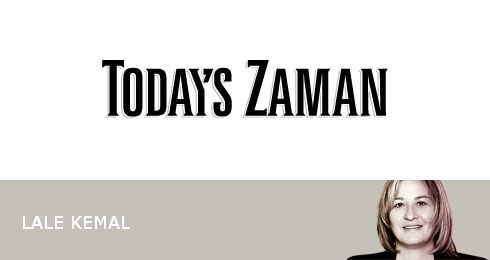
A handful of people gathered last Friday at the Ekin art gallery in downtown Ankara. This gathering was part of a series of activities and meetings held in the capital city to create awareness of the plight of lesbian, gay, bisexual, transgender and transsexual (LGBTT) persons.
The three-day meeting and activities were organized by an LGBTT association and held Friday afternoon. They tried to address poor media coverage of the issue, which mostly provokes homophobia against vulnerable groups in Turkey.
A transvestite nervously reacted to my speech, during which I tried to draw attention to the plight of both LGBTT persons and other vulnerable groups in Turkey, including women, children, the disabled and those of a different religion or ethnicity, such as the Kurds. I stressed the importance of creating a mindset of tolerance in Turkish society, which at present seriously lacks sensitivity toward vulnerable groups. This should be strengthened, I emphasized, by pushing decision makers to amend the law to criminalize hate crimes and hate speech.
The transvestite was right to be nervous, not because I was speaking but because of the lawmakers, who have been indifferent to what transvestites say is the killing of almost four transvestites a day in the streets of Turkey.
LGBTT, a group working to stop discrimination and address the plight of its members, has been calling for necessary security measures to be made available immediately to deter attacks against members of its community while advocating for a change in law so that the right, among other things, of LGBTT individuals to work and to have access to healthcare can be ensured.
Homophobia has resulted in physical and sexual violence. The killing of several transsexuals and transvestites, along with recent violence by police in Ankara against transgendered persons, are worrying developments. Courts have applied the principle of “unjust provocation” in favor of perpetrators of crimes against transsexuals and transvestites.
The principle of anti-discrimination is enshrined in the Turkish Constitution and upheld by several laws. The government has consulted civil society organizations, universities and relevant authorities on a bill seeking the establishment of an anti-discrimination and equality board.
The current legal framework, however, is not adequately aligned with EU acquis (social policy and employment), the European Union has said in its Turkey Progress Report, published on Nov. 9.
There have been several cases of discrimination at workplaces where LGBTT employees were fired because of their sexual orientation. Provisions of the Turkish Penal Code (TCK) on “public exhibitionism” and “offences against public morality” are sometimes used to discriminate against LGBTT persons. The Law on Misdemeanors is often used to impose fines against transgendered individuals, the EU report stresses.
Statements by Selma Aliye Kavaf, state minister for women and family affairs, on homosexuality being a disorder sparked reactions from the LGBTT community and human rights circles. Negative stereotyping by political figures can provoke further discrimination against LGBTT people, the EU report stresses.
Kavaf's remarks reflect the general mindset of Turks in general against vulnerable groups.
The judiciary system is also problematic in the sense that, as in many other cases, verdicts handed down by courts differ from each other on LGBTT and other similar organizations.
The Supreme Court of Appeals decided at the end of 2009 against the closure of the LGBTT association Lambda İstanbul. In a similar case against the LGBTT Black Pink Triangle Association (BPTA), the İzmir Governor's Office launched a new closure case alleging the violation of rules on morality, the EU report notes.
The Turkish Armed Forces (TSK) still have a health regulation that defines homosexuality as a “psychosexual” illness and declares homosexuals unfit for military service, as stated in the EU report. Conscripts who declare their homosexuality have to provide photographic proof. Some have had to undergo humiliating medical examinations, the same report says.
This has been denied by the military. However, an LGBTT individual has confirmed to me the humiliating process he went through when asked to provide the military with photographic proof of his homosexuality.
Addressing the problems of all vulnerable groups in Turkey is another test for Turkish democracy in respecting human rights and human dignity.
The poor participation in last Friday's conference by even the LGBTT community is also problematic and will not serve to have their plight be heard.
Lale Kemal, Today's Zaman, November 30, 2010
http://www.todayszaman.com/columnistDetail_getNewsById.action'newsId=228301

